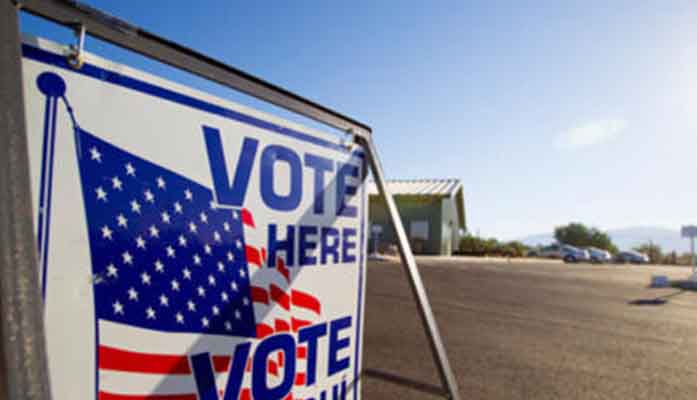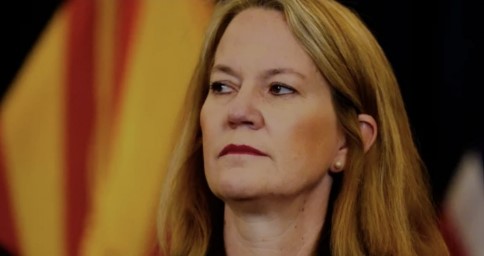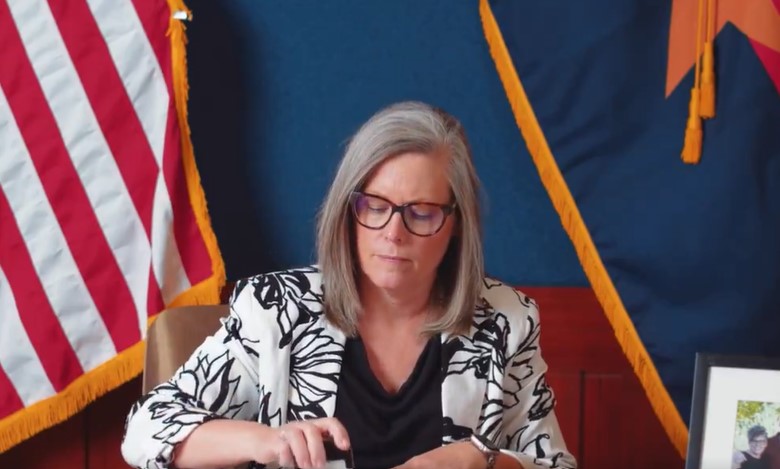
by Matthew Holloway | Jul 11, 2025 | News
By Matthew Holloway |
Earlier this week, Republican Congressman Abe Hamadeh’s (R-AZ08) social media team offered words of gratitude and even praise for Laurie Roberts, an opinion columnist for the Arizona Republic. The exhange came in regard to the framing of her recent op-ed entitled “Rep. Abe Hamadeh says no Medicaid cuts? He’s not fooling anyone.” According to Roberts, she incorrectly wrote in a post to X that the One Big Beautiful Bill Act contains cuts to Medicare, rather than reforming Medicaid.
Addressing the erroneous post, Roberts wrote a new post to X and commented, “Deleted my earlier tweet as I mistakenly said the cuts were to Medicare. Don’t want to start a panic, so I deleted it. The cuts are to Medicaid, as the column correctly points out.”
Abe Hamadeh War Room, the Rapid Response account for the Congressman’s office, highlighted Roberts’ correction writing, “Thank you for showing integrity. In this case and correcting your mistake, Laurie. Unfortunately, the Democrats have created panic for months now by conflating these two very important issues. The last thing we would want is to scare people.”
As explained by the White House, “Medicare has not been touched in this bill— absolutely nothing in the bill reduces spending on Medicare benefits. This legislation does not make a single cut to welfare programs—it safeguards and protects these programs for all eligible Americans.”
The White House further noted that H.R. 1, the One Big Beautiful Bill Act (OBBA), does not in fact make cuts to Medicaid either.
“As the President has said numerous times, there will be no cuts to Medicaid. The One Big Beautiful Bill protects and strengthens Medicaid for those who rely on it—pregnant women, children, seniors, people with disabilities, and low-income families—while eliminating waste, fraud, and abuse,” the White House wrote. “The One Big Beautiful Bill removes illegal aliens, enforces work requirements, and protects Medicaid for the truly vulnerable.”
According to the latest congressional summary of the bill, the Medicaid reform in the OBBA falls into four main categories:
Reducing Fraud and Improving Enrollment Processes
- Centers for Medicare & Medicaid Services (CMS) are to create a centralized system by 2027 for states to detect multi-state Medicaid/CHIP enrollment; states must verify addresses and report Social Security numbers monthly by FY2030; funding provided for system setup and maintenance.
- States must check Social Security Administration’s Death Master File quarterly starting 2028 to identify deceased Medicaid enrollees.
- States to verify provider termination from Medicare, other state Medicaid, or CHIP during enrollment/reenrollment starting 2028, with monthly checks thereafter.
- States to check provider death status via Death Master File during enrollment/reenrollment starting 2028, with quarterly checks thereafter.
- States to redetermine Medicaid expansion population eligibility every six months starting December 31, 2026.
- 10% reduction in enhanced federal matching rate starting FY2028 for states providing comprehensive health benefits to non-lawfully residing individuals (except children/pregnant women).
Preventing Wasteful Spending
- CMS to survey pharmacies through FY2033 for Medicaid drug pricing; non-participating pharmacies face penalties; OIG to study survey results with FY2026 funding.
- Mandates pass-through pricing and bans spread-pricing for Medicaid pharmacy benefit manager contracts.
- Prohibits Medicaid/CHIP federal payments for gender transition procedures, with exceptions for minors with parental consent for specific medical conditions.
- Bars federal Medicaid payments for 10 years to nonprofit essential community providers primarily offering family planning/abortions (beyond rape/incest/life-threatening cases) if they received over $1M in Medicaid payments in FY2024.
Stopping Abusive Financing Practices
- Non-expansion states as of March 11, 2021, must expand Medicaid by January 1, 2026, to receive enhanced federal matching rate.
- Prohibits federal matching for revenue from new or increased Medicaid provider taxes.
- Limits state-directed payments under Medicaid managed care to Medicare rates (100% for expansion states, 110% for others) through FY2033.
Increasing Personal Accountability (Work Requirements)
- Medicaid expansion population must meet 80-hour monthly work/community service/education requirements starting December 31, 2026; exemptions for medical conditions or dependent children; FY2026 funding for implementation.
- Cost-sharing required for Medicaid expansion population with income above poverty line starting FY2029; max $35 per service, 5% of family income; excludes certain services; providers may require payment upfront.
Under the OBB, Medicaid isn’t cut but is in fact mandated to expand for “non-expansion states,” to receive enhanced federally matched funding. The only individuals and families purportedly “cut” from Medicaid would be those who fail to meet the program’s work/community service/education requirements and are not exempted by medical conditions or dependent children or whose income exceeds the program’s limitations and “non-lawfully residing individuals.”
Matthew Holloway is a senior reporter for AZ Free News. Follow him on X for his latest stories, or email tips to Matthew@azfreenews.com.

by Ethan Faverino | Jul 11, 2025 | News
By Ethan Faverino |
In a critical move to combat the growing threat of drugs and contraband entering county jails, the Maricopa County Sheriff’s Office has deployed advanced LineV X-ray body scanners at its Intake, Transfer, and Release (ITR) Facility.
A total of 10 scanners have been acquired and will be installed across six active jail facilities. This will significantly enhance safety for staff, inmates, and the public.
Chief Mike Dawson of the Maricopa County Sheriff’s Office emphasized the scanners’ importance.
“This technology gives our detention deputies another tool in their arsenal to keep contraband out of our jails. Our mission is the care, custody, and control of inmates, which includes keeping them and our staff safe,” said Dawson.
The new LineV scanners are full-body imaging systems that emit less than 0.25 microsieverts of radiation, roughly 1/100th of the exposure of a typical chest X-ray.
Within just 90 minutes of these scanners being live at the ITR Facility, one scanner successfully detected drugs concealed in an inmate’s body cavity, an item that may have gone unnoticed.
The new scanning technology eliminates the need for most manual searches, helping to reduce contraband entry while improving the intake process.
There are three models of LineV scanner being utilized:
- Conpass Smart DV, which is a dual-angle, full-body X-ray system designed specifically for correctional environments. It features radiation shutters, real-time dose metering, and strict beam containment for maximum safety.
- ClearPass, a high-resolution, rapid-scanning system that produces a full body image in just three seconds, allowing for efficient and effective screening.
- Clearpass Ci, a compact, mobile scanner designed for targeted inspections for specific areas such as the torso or groin.
“My goal is to stop contraband from entering the jail system altogether,” said Maricopa County Sheriff Jerry Sheridan. “So let this serve as a warning: if you are caught smuggling drugs into or within our facilities, we will be watching closely, and you will be charged. Possession of contraband drugs will result in a class two felony charge.”
Ethan Faverino is a reporter for AZ Free News. You can send him news tips using this link.

by Jonathan Eberle | Jul 10, 2025 | News
By Jonathan Eberle |
Sixteen months before the 2026 General Election, Arizona voters already know at least three ballot measures they’ll be weighing come November. Referred to the ballot by state lawmakers during the most recent legislative session, the proposals span issues of taxation, public safety, and individual privacy.
If passed, each measure would amend the Arizona Constitution — changes that can only be undone by future statewide votes. And these early additions may just be the beginning of what’s shaping up to be another crowded ballot.
In 2024, the number of voter questions was so high that some Arizona counties resorted to printing two-sheet ballots, prompting widespread voter complaints about ballot length. With dozens of potential referrals still under consideration, the 2026 ballot may once again test voters’ patience and attention spans.
Here’s a closer look at the three measures already set for the 2026 ballot:
1. Local Food Taxes Face New Restrictions
Sponsored by Rep. Leo Biasiucci (R–LD30), House Concurrent Resolution 2021 seeks to limit the ability of local governments to impose taxes on groceries.
If approved, the measure would require cities, towns, or counties to obtain voter approval before creating or increasing a tax on food. Currently, local governments can make that decision without direct input from the electorate.
The measure would also impose a temporary moratorium on any food tax hikes until June 30, 2027.
Proponents argue the change would make groceries more affordable during a time of rising costs. Local officials, however, warn it could impact critical revenue for municipal services.
The proposal passed with bipartisan support.
2. Ban on Mileage-Based Vehicle Taxes
Senate Concurrent Resolution 1004, sponsored by Sen. Jake Hoffman (R–LD15), would preemptively ban any tax or fee based on the number of miles a vehicle travels on Arizona roadways.
While Arizona does not currently impose such a tax, Hoffman and supporters argue the measure is necessary to protect personal freedom and prevent government overreach.
“There is nothing more insidious than the government trying to limit or control their citizens’ freedom,” Hoffman said earlier this year.
Mileage-based taxes have been explored in other states, like Oregon and Utah, as a way to replace declining fuel tax revenues and reduce pollution. Environmental advocates in Arizona, including the Sierra Club, support such measures as a means of curbing emissions and promoting sustainable transportation.
The resolution passed along party lines, with Republicans in favor and most Democrats opposed or absent.
3. Designating Cartels as Terrorist Organizations
In one of the final acts of the 2025 legislative session, lawmakers approved House Concurrent Resolution 2055, which seeks to classify drug cartels as terrorist organizations under Arizona law.
Introduced by House Speaker Steve Montenegro (R–LD29), the measure would direct the state’s Department of Homeland Security to take all possible actions within its authority to counteract cartel activity.
Supporters say it complements Proposition 314, a 2024 ballot measure that authorized Arizona to enforce its own border security measures — though that law remains on hold pending the outcome of a related Texas lawsuit.
These early measures may just scratch the surface. Dozens of proposed ballot referrals were introduced during this year’s session, and lawmakers still have the 2026 legislative calendar to revive stalled proposals or introduce new ones.
As Arizona continues its tradition of robust direct democracy, election officials may once again find themselves preparing for a complex and lengthy ballot — and voters will need to prepare for an equally complex decision-making process at the polls.
Jonathan Eberle is a reporter for AZ Free News. You can send him news tips using this link.

by Matthew Holloway | Jul 10, 2025 | News
By Matthew Holloway |
Joining KFYI’s Conservative Circus host James T. Harris on Monday, Arizona House Majority Leader Michael Carbone doubled down on comments he made to the Arizona Daily Independent (ADI) on Saturday. Carbone offered the outlet a sound condemnation of Arizona Attorney General Kris Mayes for her lawsuit against the Trump administration’s efforts to end discriminatory marketing of affordable housing.
As reported by ADI, Mayes and a coalition of 21 Democrat attorneys general have launched their legal action after Secretary of the U.S. Department of Housing and Urban Development Scott Turner announced that HUD is “examining ways to slash burdensome regulations that stifle the private sector’s ability to innovate and build much-needed housing supply.”
Among the reforms Mayes and her fellow leftist AG’s voiced opposition to is a proposed rule that would end fair housing regulations that required targeted marketing of affordable housing based on race.
“We’re never going to fix the affordable housing crisis by pushing radical left-wing identity politics,” Carbone told the Daily Independent. “Taxpayer-funded programs should serve all Americans fairly—not pick winners and losers based on race, ethnicity, or national origin. The Trump administration is right to stand up for equal treatment under the law. It’s shameful that Attorney General Mayes would rather play politics and protect discrimination than fight for real solutions that help everyone.”
Speaking with James T. Harris on Monday, Carbone explained, “It’s really a leftist idea what they’re doing. You know, when we create rules, they create behaviors. And all what Trump is trying to do is look at these bad rules. We should let the free market take place, do what it does fast, and then you know… then everything will work itself out, right? No other country in the world can show that, but the America can show that.”
When asked why Mayes is campaigning to keep the affordable housing marketing mandates in place, the Majority Leader answered that Mayes is “flaky to her base #1″ and “these leftists always want to create rules to change the behaviors. And they actually go backwards. They take us backwards.”
He added, “And I said, you go anywhere in the world. When you see the free market here in America, it works the best. We have the best results to show that compared to any country in the world…There’s a reason why President Trump won by a landslide victory, right? He won every class, every race, every group…he killed it. Because people, I think, are getting wind and are tired of the same old crap that the Democrats are playing.”
Carbone, a Chicago-native went on to elaborate on his statement that AG Mayes would “rather protect discrimination” by HUD, explaining, “Look, I grew up in Chicago. I grew up in a three flat with my mom, a single mom with me, my two brothers. And, and you know, we weren’t… we didn’t have a lot of money.
“But I’ll tell you right now where I looked, I was one of the fewest white people around. And you know, when you look at projects, that was a… that was created by the government, by local and federal government projects. And you have to ask the question. I mean, go back, why do you have to create these things? Why do we have to get $30,000, Governor Hobbs’ $30,000 down payment assistance to people?
“And when you fill out that application, it asks you, not who you are, what do you do and who are you? Ethnicity, what group or background you have? Why is that important? And I think people realize we all want to be treated equally. We do. When you do this, you go into a pivot of focusing on certain classifications. And this is what the democratic mantra has been for the last 40 years. They’ve been very good at it. And I think the American people are now woken up and are tired of it.”
Harris replied, saying of Mayes, “It’s like she’s weaponizing taxpayers, wag(ing) a political war against the Trump administration. I mean, is this becoming a pattern with her?”
To which Carbone answered, “OK, this is not only a pattern with her, JT, it’s a pattern with the Democratic machine. Let’s go back to Obama. Obama did this. If people remember, Obama tried doing this, this pilot program where if you had wealthy neighborhoods and you had rent that was probably five times higher than the average rent down the street, which might have been a lower class of income, that those people should have a right to live in those and our tax dollars should pay for that. I’m going back about 15 years. I don’t know if you remember that, but that was a pilot program. I don’t know if it still exists. But the thing is: that’s not how, that’s not how the world works. That’s socialism. That’s a different class of government, different types of economics.”
Matthew Holloway is a senior reporter for AZ Free News. Follow him on X for his latest stories, or email tips to Matthew@azfreenews.com.

by Jonathan Eberle | Jul 9, 2025 | News
By Jonathan Eberle |
Arizona Governor Katie Hobbs has set a new record for vetoes in a single legislative session, rejecting 178 bills passed by the Republican-controlled Legislature, surpassing her previous record of 143 in 2023. While Hobbs wielded her veto pen often, she also signed 264 bills into law.
The legislative session, which ended in June, underscored the deep ideological divide between the Democratic governor and Republican lawmakers, with repeated clashes over immigration, election integrity, and social policy. Still, some bipartisan efforts did make it to the governor’s desk and gained her approval.
National Security and Border Policy
Hobbs approved Senate Bill 1082, a measure barring foreign adversaries—including China, Russia, Iran, and North Korea—from purchasing land in Arizona. The governor said the law would help protect military bases and infrastructure amid rising global tensions.
Yet, she vetoed a similar proposal, SB 1109, that targeted only China, along with a string of more aggressive border enforcement bills. Notably, SB 1164, known as the Arizona ICE Act, and HB 2099, both aimed to expand cooperation between state and federal authorities on immigration. Hobbs argued that decisions about immigration policy should remain in the hands of Arizonans, not Washington politicians.
Election Integrity Measures
Election security was another flashpoint. Hobbs rejected several Republican-sponsored bills she claimed would restrict voting access. Among them were:
- HB 2017, which would have capped voting precincts and eliminated on-site voting centers.
- HB 2046, a proposed change to audit procedures that Hobbs called inefficient.
- HB 2050, requiring daily updates on signature mismatches and enabling political party access to provisional ballots.
She also vetoed HB 2703, which sought to speed up election result reporting by cutting off ballot drop-offs on Election Day, calling it a form of voter suppression.
Education Policy
On education, Hobbs opposed efforts she viewed as punitive or politically motivated. She rejected:
- SB 1694, which would have barred state funding for higher ed institutions offering diversity, equity, and inclusion (DEI) courses.
- HB 2610, which would have allowed for the removal of school boards in financially mismanaged districts.
Conversely, she signed HB 2880, prohibiting unauthorized encampments on college campuses, and HB 2164, banning public schools from offering foods with synthetic chemicals like red dye 3 and potassium bromate.
Economic Legislation
Hobbs approved a slate of bills aimed at bolstering the state’s economy:
- HB 2704 greenlights renovations to Chase Field, home of the Arizona Diamondbacks, without raising taxes.
- SB 1182 ensures that construction crews can work early morning hours during Arizona’s scorching summers.
- HB 2119 increases transparency by requiring municipalities to give the public at least 60 days’ notice before voting on tax hikes.
This year’s record-setting number of vetoes highlights the persistent friction between Hobbs and the Legislature. While Republicans argue their legislation reflects the will of Arizona voters, Hobbs maintains that many of the bills would have restricted personal freedoms, hurt vulnerable communities, or created unnecessary bureaucracy.
With more sessions ahead and no signs of a political truce, Arizona’s divided government is likely to remain locked in debate.
Jonathan Eberle is a reporter for AZ Free News. You can send him news tips using this link.

by Ethan Faverino | Jul 9, 2025 | News
By Ethan Faverino |
The Cochise County Sheriff’s Office announced Monday, July 7th, that they will be launching a state-of-the-art drone pilot program. They will be partnering with Draganfly Inc. to bring a cutting-edge initiative designed to enhance surveillance and operational capabilities along the U.S.-Mexico border.
This aligns with President Donald Trump’s executive order, “Unleashing American Drone Dominance.” The order prioritizes the use of advanced unmanned aerial systems to strengthen national security.
Known for their innovative approach to border security, the Cochise County Sheriff’s Office continues to lead the way in technology integration.
They have previously deployed tools such as high-resolution camera networks, sensor-integrated mobile units, and ground surveillance radar systems, which they use for border enforcement.
The department has received national recognition from President Trump and Vice President JD Vance for their commitment to technology-driven border solutions.
“The Southern Border is one of America’s most critical national security frontiers. Our organization has always been committed to leveraging the best tools available,” said Captain Tim Williams. “With Draganfly as our drone partner, we’re entering the next phase of smart border enforcement. Their North American and U.S.-built systems will enhance our ability to protect communities, manage humanitarian concerns, and respond rapidly to evolving threats.”
Draganfly Inc., a leader in drone innovation, has been developing unmanned aerial solutions for over 20 years. They specialize in advanced aerial technology, software, and AI systems for emergency response, public safety, agriculture, and defense.
CEO of Draganfly, Cameron Chell, said, “We are honored to be working with the Cochise County Sheriff’s Office for this historic program. Their team represents some of the best of American law enforcement: innovation-focused, community-minded, and mission-ready. This project embodies the spirit of President Trump’s executive order and sets a gold standard for how drone technology should be used to secure national borders.”
The new pilot program at the Cochise County Sheriff’s Office will use Draganfly’s “Family of Drones.”
It will feature long-endurance fixed-wing UAVs for extended surveillance, AI-powered quadcopters for rapid-response missions, and thermal imaging drones for search and rescue missions, as well as nighttime operations.
The “Family of Drones” is designed for rugged reliability and secure data handling, which will withstand the harsh and remote terrain of the Cochise County Border.
Ethan Faverino is a reporter for AZ Free News. You can send him news tips using this link.






